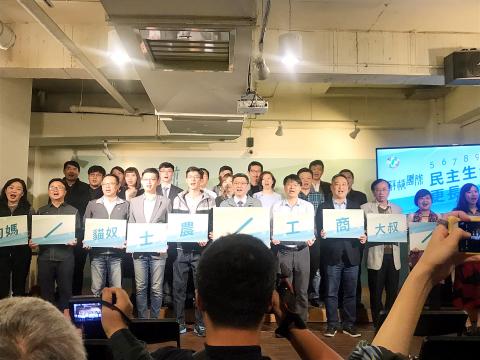The Democratic Progressive Party (DPP) yesterday announced new appointments intended to boost party morale following the DPP’s defeats in the nine-in-one elections in November last year.
At a news conference at the party’s headquarters in Taipei, the DPP referred to the new appointees as the “slash group.”
Each member has various abilities and interests that would “bring creativity” to the party, DPP Secretary-General Luo Wen-jia (羅文嘉) said.

Photo: Su Fun-her, Taipei Times
Lee Ming-li (李明俐), who is one of the party’s new spokespeople, has a background in cultural policy studies, but no experience with politics, which has caused many to look at her appointment with great interest, he said.
Veteran party worker Kao Hsing-hsueh (高幸雪), Taiwan Normal Country Promotion Association member Kuo Kun-wen (郭昆文) and Hsu Chia-ching (徐佳青) of the DPP’s former New Tide faction are to be the party’s new deputy secretaries-general.
Lee Ching-feng (李慶峰) — a former DPP Taipei City councilor — is to head the party’s organizational development department, while Wang Po-chun (王柏鈞), who previously headed the Taiwan Youth Citizen Association, is to lead the communications department.
Johnny Lin (林琮盛), who was a reporter in China, is to head the campaign intelligence department. Veteran party worker Lin Hsiu-ling (林秀玲) is to be secretariat director, while the online communications department is to be lead by Ho Meng-hua (何孟樺), who had been directing the party’s youth department.
Chen Chang-wei (陳長偉), who is to head the social movement department, has worked in Yilan County’s Business and Tourism Department.
Veteran party worker Chiu Shih-yuan (邱世元) is to head the religion department, while the agriculture and fisheries department is to be run by Huang Te-cheng (黃德成), who has a background in agricultural studies.
Chen Yi-ting (陳奕廷), who previously worked in online media, is to head the social issues department.
DPP Hakka affairs department head Chou Chiang-chieh (周江杰) is also to act as a party spokesperson, while the new youth department director, Yan Juo-fang (顏若芳), was previously a Taipei City councilor.
The international affairs department is to be headed by DPP Legislator Lin Ching-yi (林靜儀). Deputy director of the office of the DPP secretary-general Sun Mei-hui (孫美惠) was formerly a member of a well-known dance troupe.
The public relations department is to be headed by businessman Hsieh Yu-li (謝雨利).
The public research center is to be headed by Lee Kuan-yi (李冠毅), who used to be a director at the legislators’ office, as well as the Thinking Taiwan Foundation.
Veteran party worker Lin Ping-chung (林秉忠) is to head the labor department, while former Executive Yuan deputy spokesman Ting Yun-kong (丁允恭) is to be the news department director.
“All of these people have different roles ... but at this moment we all share a single role, which is to fight to protect our democratic way of life,” Luo said.
At the end of the news conference, Luo spoke further about Lee Ming-li, praising her background in foreign languages, translation and the teaching of Taiwanese history.
Lee Ming-li has worked hard to preserve historical Taiwanese sites, he added.
Part of her interest in culture comes from her diverse background, as her grandfather was Mongolian and her grandmother was a Rukai Aborigine, he said.

Taiwan is stepping up plans to create self-sufficient supply chains for combat drones and increase foreign orders from the US to counter China’s numerical superiority, a defense official said on Saturday. Commenting on condition of anonymity, the official said the nation’s armed forces are in agreement with US Admiral Samuel Paparo’s assessment that Taiwan’s military must be prepared to turn the nation’s waters into a “hellscape” for the Chinese People’s Liberation Army (PLA). Paparo, the commander of the US Indo-Pacific Command, reiterated the concept during a Congressional hearing in Washington on Wednesday. He first coined the term in a security conference last

A magnitude 4.3 earthquake struck eastern Taiwan's Hualien County at 8:31am today, according to the Central Weather Administration (CWA). The epicenter of the temblor was located in Hualien County, about 70.3 kilometers south southwest of Hualien County Hall, at a depth of 23.2km, according to the administration. There were no immediate reports of damage resulting from the quake. The earthquake's intensity, which gauges the actual effect of a temblor, was highest in Taitung County, where it measured 3 on Taiwan's 7-tier intensity scale. The quake also measured an intensity of 2 in Hualien and Nantou counties, the CWA said.

The Overseas Community Affairs Council (OCAC) yesterday announced a fundraising campaign to support survivors of the magnitude 7.7 earthquake that struck Myanmar on March 28, with two prayer events scheduled in Taipei and Taichung later this week. “While initial rescue operations have concluded [in Myanmar], many survivors are now facing increasingly difficult living conditions,” OCAC Minister Hsu Chia-ching (徐佳青) told a news conference in Taipei. The fundraising campaign, which runs through May 31, is focused on supporting the reconstruction of damaged overseas compatriot schools, assisting students from Myanmar in Taiwan, and providing essential items, such as drinking water, food and medical supplies,

New Party Deputy Secretary-General You Chih-pin (游智彬) this morning went to the National Immigration Agency (NIA) to “turn himself in” after being notified that he had failed to provide proof of having renounced his Chinese household registration. He was one of more than 10,000 naturalized Taiwanese citizens from China who were informed by the NIA that their Taiwanese citizenship might be revoked if they fail to provide the proof in three months, people familiar with the matter said. You said he has proof that he had renounced his Chinese household registration and demanded the NIA provide proof that he still had Chinese